高中英语条件状语从句的句型
- 格式:docx
- 大小:38.62 KB
- 文档页数:6
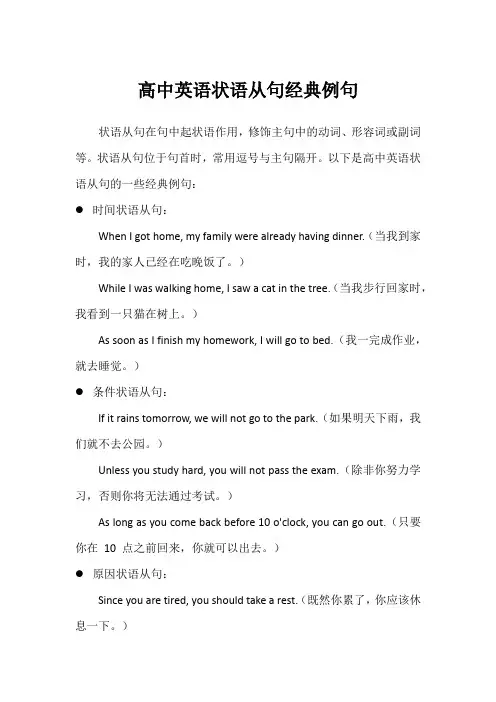
高中英语状语从句经典例句状语从句在句中起状语作用,修饰主句中的动词、形容词或副词等。
状语从句位于句首时,常用逗号与主句隔开。
以下是高中英语状语从句的一些经典例句:●时间状语从句:When I got home, my family were already having dinner.(当我到家时,我的家人已经在吃晚饭了。
)While I was walking home, I saw a cat in the tree.(当我步行回家时,我看到一只猫在树上。
)As soon as I finish my homework, I will go to bed.(我一完成作业,就去睡觉。
)●条件状语从句:If it rains tomorrow, we will not go to the park.(如果明天下雨,我们就不去公园。
)Unless you study hard, you will not pass the exam.(除非你努力学习,否则你将无法通过考试。
)As long as you come back before 10 o'clock, you can go out.(只要你在10 点之前回来,你就可以出去。
)●原因状语从句:Since you are tired, you should take a rest.(既然你累了,你应该休息一下。
)Because he was ill, he didn't go to school yesterday.(因为他病了,所以昨天他没有去上学。
)As the weather is so hot, we decide to go swimming.(由于天气太热,我们决定去游泳。
)●目的状语从句:In order that he can pass the exam, he studies very hard.(为了能通过考试,他学习非常努力。
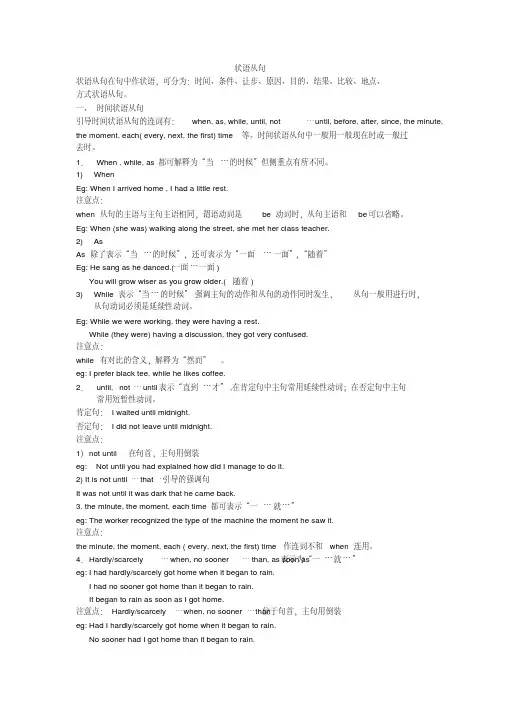
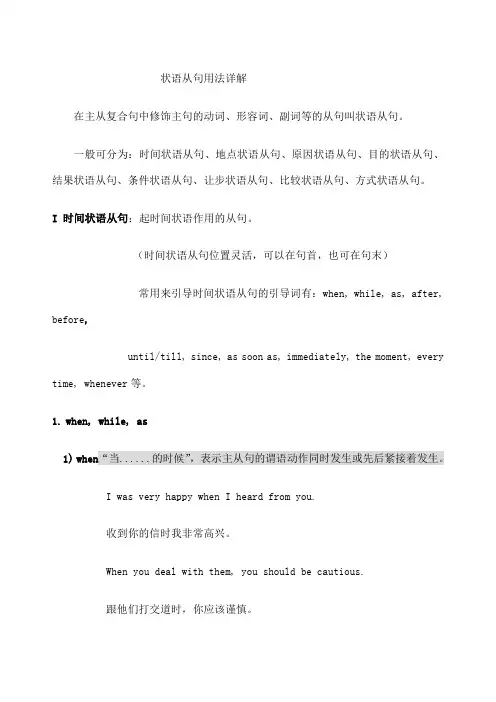
状语从句用法详解在主从复合句中修饰主句的动词、形容词、副词等的从句叫状语从句。
一般可分为:时间状语从句、地点状语从句、原因状语从句、目的状语从句、结果状语从句、条件状语从句、让步状语从句、比较状语从句、方式状语从句。
I 时间状语从句:起时间状语作用的从句。
(时间状语从句位置灵活,可以在句首,也可在句末)常用来引导时间状语从句的引导词有:when, while, as, after, before,until/till, since, as soon as, immediately, the moment, every time, whenever等。
1.when, while, as1) when“当......的时候”,表示主从句的谓语动作同时发生或先后紧接着发生。
I was very happy when I heard from you.收到你的信时我非常高兴。
When you deal with them, you should be cautious.跟他们打交道时,你应该谨慎。
when引导时间状语从句中的谓语动词可以用非延续性动词,也可用延续性动词。
When I was young, I went to town myself.当我还年轻时,我自己独自去城里。
(延续性动词)When I lived in country, I used to carry some water for him.我住在农村时,常常为他担水。
(延续性动词)When he received the letter, he'll tell us.当他接到信后,他会告诉我们的。
(非延续性动词)When the fire broke out, all the students were sleeping soundly.火灾发生时,所有的学生正在熟睡。
(非延续性动词)注意:当when引导的时间状语从句为系表结构,而且其主语和主句的主语一致,其表语又是一个名词时,就可以用由as引导的省略句来代替when引导的从句。
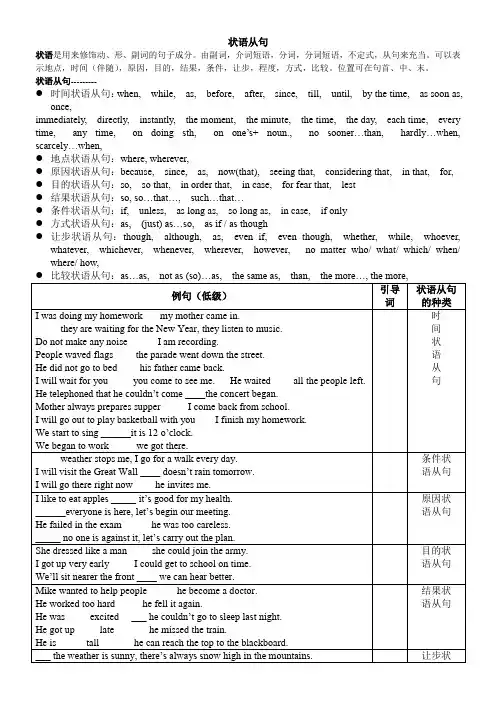
状语从句状语是用来修饰动、形、副词的句子成分。
由副词,介词短语,分词,分词短语,不定式,从句来充当。
可以表示地点,时间(伴随),原因,目的,结果,条件,让步,程度,方式,比较。
位置可在句首、中、末。
状语从句---------●时间状语从句:when, while, as, before, after, since, till, until, by the time, as soon as,once,immediately, directly, instantly, the moment, the minute, the time, the day, each time, every time, any time, on doing sth, on one’s+ noun., no sooner…than, hardly…when, scarcely…when,●地点状语从句:where, wherever,●原因状语从句:because, since, as, now(that), seeing that, considering that, in that, for, ●目的状语从句:so, so that, in order that, in case, for fear that, lest●结果状语从句:so, so…that…, such…that…●条件状语从句:if, unless, as long as, so long as, in case, if only●方式状语从句:as, (just) as…so, as if / as though●让步状语从句:though, although, as, even if, even though, whether, while, whoever,whatever, whichever, whenever, wherever, however, no matter who/ what/ which/ when/ where/ how,。
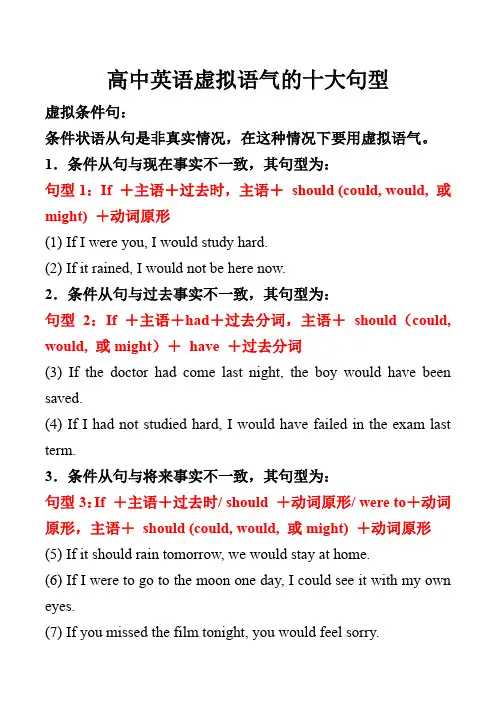
高中英语虚拟语气的十大句型虚拟条件句:条件状语从句是非真实情况,在这种情况下要用虚拟语气。
1.条件从句与现在事实不一致,其句型为:句型1:If +主语+过去时,主语+should (could, would, 或might) +动词原形(1) If I were you, I would study hard.(2) If it rained, I would not be here now.2.条件从句与过去事实不一致,其句型为:句型2:If +主语+had+过去分词,主语+should(could, would, 或might)+have +过去分词(3) If the doctor had come last night, the boy would have been saved.(4) If I had not studied hard, I would have failed in the exam last term.3.条件从句与将来事实不一致,其句型为:句型3:If +主语+过去时/ should +动词原形/ were to+动词原形,主语+should (could, would, 或might) +动词原形(5) If it should rain tomorrow, we would stay at home.(6) If I were to go to the moon one day, I could see it with my own eyes.(7) If you missed the film tonight, you would feel sorry.注意问题:1.If条件句中绝对不可以出现would。
2.根据句中的时间状语,有时可能出现“混合虚拟”的情况,即主句可能是现在的情况,条件句也许是发生在过去的情况,但都要遵守上述句型。
如:(8) If you had studied hard before, you would be a college student now and you would graduate from a college in four years’time. 3.条件句中如果出现were, had, should可省去if,将主语与这些词倒装。
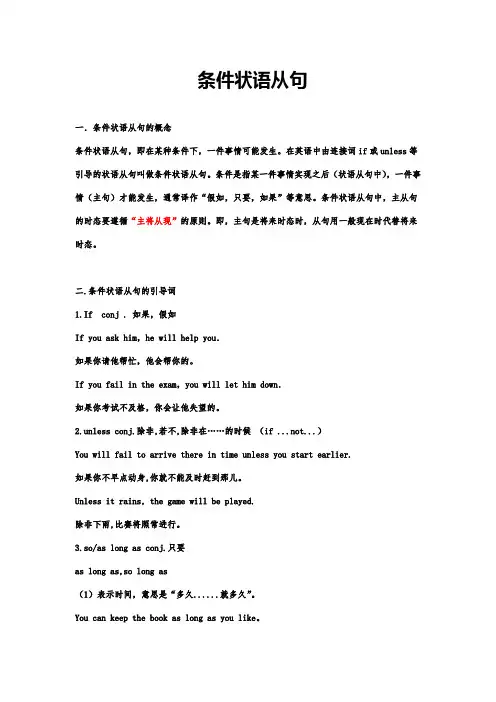
条件状语从句一.条件状语从句的概念条件状语从句,即在某种条件下,一件事情可能发生。
在英语中由连接词if或unless等引导的状语从句叫做条件状语从句。
条件是指某一件事情实现之后(状语从句中),一件事情(主句)才能发生,通常译作“假如,只要,如果”等意思。
条件状语从句中,主从句的时态要遵循“主将从现”的原则。
即,主句是将来时态时,从句用一般现在时代替将来时态。
二.条件状语从句的引导词1.If conj . 如果,假如If you ask him,he will help you.如果你请他帮忙,他会帮你的。
If you fail in the exam,you will let him down.如果你考试不及格,你会让他失望的。
2.unless conj.除非,若不,除非在……的时候(if ...not...)You will fail to arrive there in time unless you start earlier.如果你不早点动身,你就不能及时赶到那儿。
Unless it rains, the game will be played.除非下雨,比赛将照常进行。
3.so/as long as conj.只要as long as,so long as(1)表示时间,意思是“多久......就多久”。
You can keep the book as long as you like。
这本书你爱看多久就看多久。
During the holidays,I like to stay in the countryside as long as I can.假日里,我喜欢呆在乡下,能呆多久就呆多久。
(2)表示条件,意思是“只要”。
例如:As long as you tell the truth,I’ll try to help you.只要你告诉我实情,我会尽力帮助你。
You may take this book away so long as you return it on time.只要你按时归还,就可以把这本书拿走。
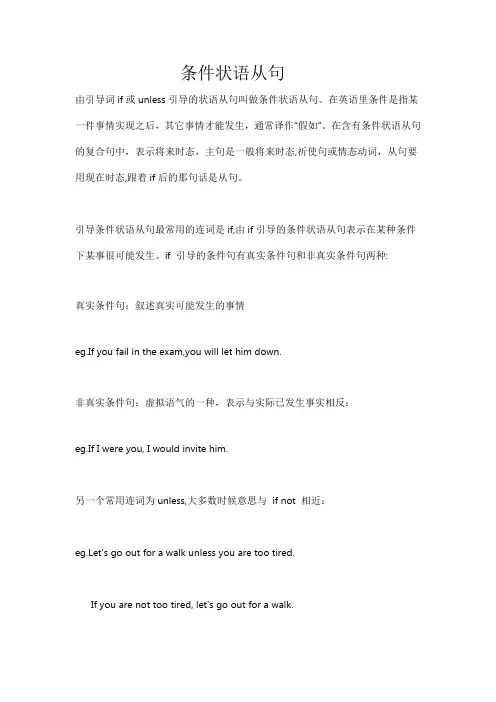
条件状语从句
由引导词if或unless引导的状语从句叫做条件状语从句。
在英语里条件是指某一件事情实现之后,其它事情才能发生,通常译作“假如”。
在含有条件状语从句的复合句中,表示将来时态,主句是一般将来时态,祈使句或情态动词,从句要用现在时态,跟着if后的那句话是从句。
引导条件状语从句最常用的连词是if,由if引导的条件状语从句表示在某种条件下某事很可能发生。
if 引导的条件句有真实条件句和非真实条件句两种:
真实条件句:叙述真实可能发生的事情
eg.If you fail in the exam,you will let him down.
非真实条件句:虚拟语气的一种,表示与实际已发生事实相反:
eg.If I were you, I would invite him.
另一个常用连词为unless,大多数时候意思与if not 相近:
eg.Let's go out for a walk unless you are too tired.
If you are not too tired, let's go out for a walk.
好了经过这些讲解,不知道大家对条件状语从句有没有了初步的认识呢?其实对于这类语法,大多数学习者都是熟悉的,平常在口语,阅读,或写作中都会经常遇到此类句子,只是并不知道系统的语法,所以大家要做的就是对号入座,然后在脑中形成一个只是系统,这样才能真正做到夯实基础。
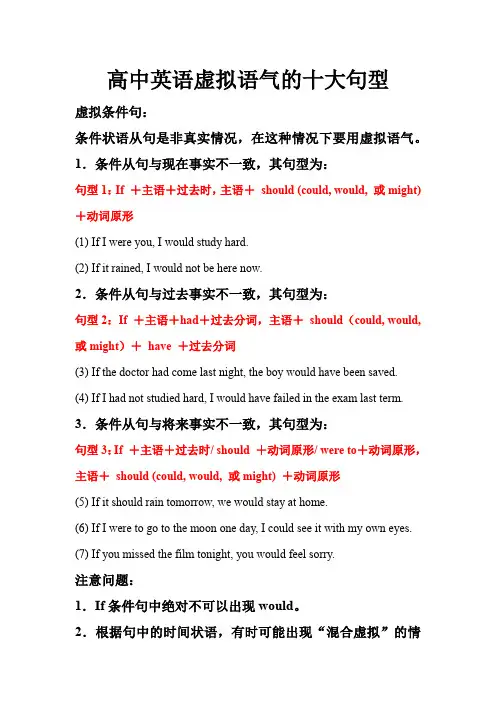
高中英语虚拟语气的十大句型虚拟条件句:条件状语从句是非真实情况,在这种情况下要用虚拟语气。
1.条件从句与现在事实不一致,其句型为:句型1:If +主语+过去时,主语+should (could, would, 或might) +动词原形(1) If I were you, I would study hard.(2) If it rained, I would not be here now.2.条件从句与过去事实不一致,其句型为:句型2:If +主语+had+过去分词,主语+should(could, would, 或might)+have +过去分词(3) If the doctor had come last night, the boy would have been saved.(4) If I had not studied hard, I would have failed in the exam last term. 3.条件从句与将来事实不一致,其句型为:句型3:If +主语+过去时/ should +动词原形/ were to+动词原形,主语+should (could, would, 或might) +动词原形(5) If it should rain tomorrow, we would stay at home.(6) If I were to go to the moon one day, I could see it with my own eyes.(7) If you missed the film tonight, you would feel sorry.注意问题:1.If条件句中绝对不可以出现would。
2.根据句中的时间状语,有时可能出现“混合虚拟”的情况,即主句可能是现在的情况,条件句也许是发生在过去的情况,但都要遵守上述句型。
如:(8) If you had studied hard before, you would be a college student now and you would graduate from a college in four years’time.3.条件句中如果出现were, had, should可省去if,将主语与这些词倒装。
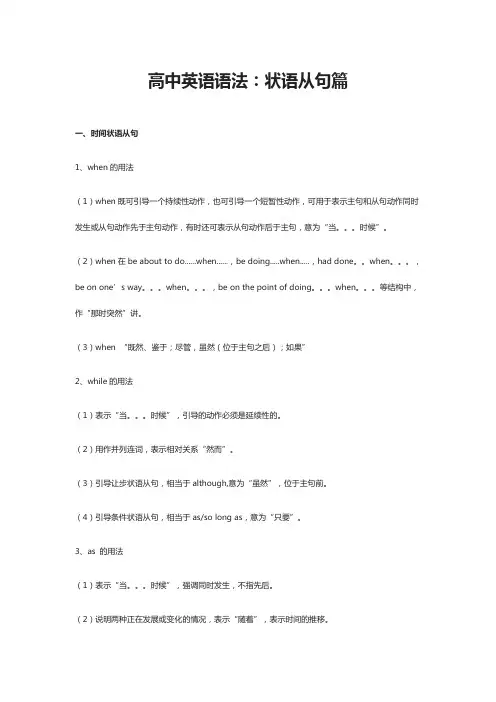
高中英语语法:状语从句篇一、时间状语从句1、when的用法(1)when既可引导一个持续性动作,也可引导一个短暂性动作,可用于表示主句和从句动作同时发生或从句动作先于主句动作,有时还可表示从句动作后于主句,意为“当。
时候”。
(2)when在be about to do......when......,be doing.....when.....,had done。
when。
,be on one’s way。
when。
,be on the point of doing。
when。
等结构中,作“那时突然”讲。
(3)when “既然、鉴于;尽管,虽然(位于主句之后);如果”2、while的用法(1)表示“当。
时候”,引导的动作必须是延续性的。
(2)用作并列连词,表示相对关系“然而”。
(3)引导让步状语从句,相当于although,意为“虽然”,位于主句前。
(4)引导条件状语从句,相当于as/so long as,意为“只要”。
3、as 的用法(1)表示“当。
时候”,强调同时发生,不指先后。
(2)说明两种正在发展或变化的情况,表示“随着”,表示时间的推移。
(4)强调两个动作紧接着发生。
(5)表示“虽然,尽管”。
(6)其他含义“正如,正像”,“作为”,“由于,因为”。
4、before的用法(1)一般意为“在。
之前”“。
才”,“。
就”“还没有。
”“免得”“不知不觉”“宁可,宁愿”,“否则,要不然”。
(2)It + will be/was + 时间段+before+一般现在时/一般过去时。
在肯定句中,意为“多长时间之后才”;在否定句中,意为“用不了多长时间就”。
5、until和till(1)与肯定句连用,必须是延续性动词。
(2)与否定句连用,必须是非延续性动词,表示“直到。
才,在。
之前不。
”。
注意:not until可用于强调句和倒装句强调句:It is/was not until…that…倒装句:not until 放句首时,主句要部分倒装。
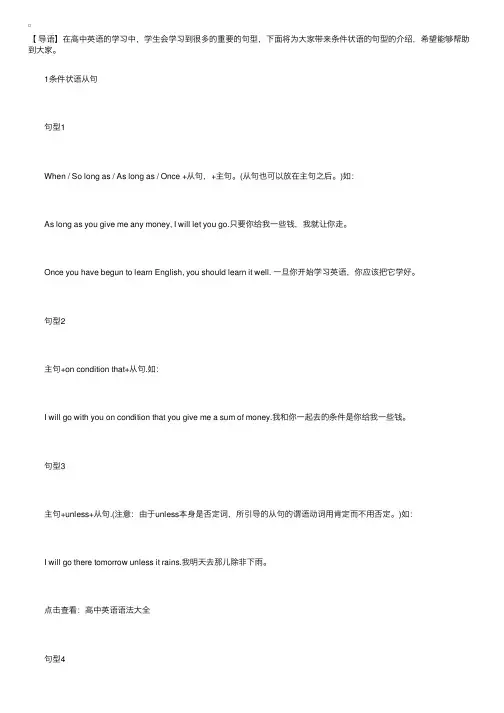
【导语】在⾼中英语的学习中,学⽣会学习到很多的重要的句型,下⾯将为⼤家带来条件状语的句型的介绍,希望能够帮助到⼤家。
1条件状语从句 句型1 When / So long as / As long as / Once +从句,+主句。
(从句也可以放在主句之后。
)如: As long as you give me any money, I will let you go.只要你给我⼀些钱,我就让你⾛。
Once you have begun to learn English, you should learn it well. ⼀旦你开始学习英语,你应该把它学好。
句型2 主句+on condition that+从句.如: I will go with you on condition that you give me a sum of money.我和你⼀起去的条件是你给我⼀些钱。
句型3 主句+unless+从句.(注意:由于unless本⾝是否定词,所引导的从句的谓语动词⽤肯定⽽不⽤否定。
)如: I will go there tomorrow unless it rains.我明天去那⼉除⾮下⾬。
点击查看:⾼中英语语法⼤全 句型4 祈使句,+and/ and then+主句。
(注意:祈使句也可⽤⼀个名词短语。
)如: Use your head, and you will find a good idea.动脑筋想⼀想,你就会想出⼀个好主意。
Another word, and I will beat you.你再说⼀句,我就揍你。
句型5 If +necessary / impossible/ important等,+主句.(注意:if与形容词之间的it is被省略。
)如: If necessary, I will do it. 如果有必要的话,我来做此事。
2原因状语从句 句型1 主句+in case+从句.(in case表⽰以免)如: I will take my raincoat in case it rains.我要把⾬⾐带上以免下⾬。
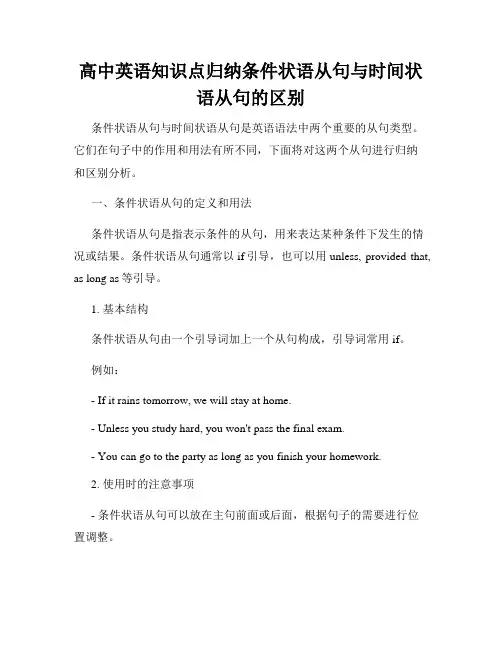
高中英语知识点归纳条件状语从句与时间状语从句的区别条件状语从句与时间状语从句是英语语法中两个重要的从句类型。
它们在句子中的作用和用法有所不同,下面将对这两个从句进行归纳和区别分析。
一、条件状语从句的定义和用法条件状语从句是指表示条件的从句,用来表达某种条件下发生的情况或结果。
条件状语从句通常以if引导,也可以用unless, provided that, as long as等引导。
1. 基本结构条件状语从句由一个引导词加上一个从句构成,引导词常用if。
例如:- If it rains tomorrow, we will stay at home.- Unless you study hard, you won't pass the final exam.- You can go to the party as long as you finish your homework.2. 使用时的注意事项- 条件状语从句可以放在主句前面或后面,根据句子的需要进行位置调整。
- 如果主句和从句的主语一致,可以将主语和一般现在时的助动词省略。
- 如果条件状语从句位于主句之前,主句和从句之间需要使用逗号隔开。
例如:- We will stay at home if it rains tomorrow.- You won't pass the final exam unless you study hard.- As long as you finish your homework, you can go to the party.二、时间状语从句的定义和用法时间状语从句是指表示时间关系的从句,用来描述某个动作或事件发生的时间。
时间状语从句通常以when, while, before, after, as soon as 等引导。
1. 基本结构时间状语从句由一个引导词加上一个从句构成,引导词常用when, while, before, after, as soon as等。
2023年高中语法条件状语从句用法说明讲义1. 引导让步状语从句的连词:“though,although,even though,even if ”等连词常被用来引导让步状语从句。
这些词引导让步状语从句时,主句不可用but,但可以用yet或still.例句:Although he tried hard, (yet/still) he failed.尽管他很努力了,但仍然失败了。
Though he was inexperienced, he did a very good job.尽管没有经验,但他表现得很不错。
(1)His first lecture was delivered on Nov.4, 1915, and it explained his new approach, though he admitted he did not yet have the precise mathematical formulation of it本句考查的是由though引导的让步状语从句。
句子前半句为肯定句,后半句为否定句,是典型的转折关系。
【参考译文】他的第一场讲座安排在1915年11月4日,爱因斯坦解释了他的新方法,虽然他也坦承自己尚未找到精确的数学公式。
(2)Although simple versions of miniature devices have hadan impact, advanced versions are still several years away. 本句考查although引导的让步状语从句。
句子前半句为否定句,后半句为肯定句,是典型的转折关系。
【参考译文】尽管简单版的微型装置已经起到了一定的作用,但更高级的微型装置的问世仍需要几年时间。
2. 表示让步转折关系的介词这些介词主要有despite,in spite of,for all和notwithstanding。
【最新】高中英语语法:条件状语从句-优秀word范文
本文部分内容来自网络整理,本司不为其真实性负责,如有异议或侵权请及时联系,本司将立即删除!
== 本文为word格式,下载后可方便编辑和修改! ==
高中英语语法:条件状语从句
高中英语语法:条件状语从句
连接词主要有 if , unless , as / so long as , on condition that 等。
if 引导的条件句有真实条件句和非真实条件句两种。
非真实条件句已在虚拟语气中阐述。
unless = if not . 例如:
Lets go out for a walk unless you are too tired . 如果不太累,我们去散散步。
If you are not too tied , lets go out for a walk .
典型例题
You will be late ___ you leave immediately .
A . unless
B . until
C . if
D . or
答案 A .句意:除非你立即走,否则你就回迟到的。
可转化为 If you dong leave immediately , you will be late . B 、 D 句意不对, or 表转折,句子如为 You leave immediately or you will be late .。
条件状语从句。
条件状语从句是表示条件的句子,通常由连词if引导。
以下是几个条件状语从句的示例:
1.If it rains tomorrow, we will cancel the picnic. 如果明天下
雨,我们会取消野餐。
2.If you study hard, you will succeed in the exam. 如果你努力学
习,你会在考试中取得成功。
3.Unless you arrive on time, you will miss the train. 除非你按时
到达,否则你会错过火车。
4.If it weren't for your help, we wouldn't have finished the
work. 如果没有你的帮助,我们不会完成工作。
5.Assuming all goes well, we should arrive on time. 如果一切顺
利,我们应该能按时到达。
在这些示例中,if、unless、if it weren't for和assuming都是引导条件状语从句的连词。
它们后面的句子是条件状语从句,表示某个条件或情况。
在这些条件状语从句中,通常描述的是未来的可能性或过去的条件。
高中英语语法条件状语从句讲解概念定义由引导词if或unless引导的状语从句叫做条件状语从句。
在英文中,条件是指某一件情况实现之后(状语从句中的动作),其它情况(主句中的动作)才能发生,通常译作“假如”。
(注意:在含有条件状语从句的复合句中,表示今后时态,主句是一样今后时态,祈使句或情态动词,从句要用现在时态,[主将从现原则](主将从现,将并非指今后时,还指表示今后含义的,跟着if后的那句话是从句。
)类型条件状语从句语法引导条件状语从句最常用的连词是if,由if引导的条件状语从句表示在某种条件下某事专门可能发生。
如:1)If you ask him,he will help you.假如你请他帮忙,他会帮你的。
2)If you fail in the exam,you will let him down.假如你考试不及格,你会让他败兴的if引导的条件状语从句既能够将从句放前面也能够将从句放后面(假如天下雨,我们就不玩了)If it rains,we will stop playing.‘转为We will stop playing if it rains.if引导的条件状语从句另外,if从句还表示不可实现的条件或全然不可能存在的条件,也确实是一种虚拟的条件或假设,从句多用一样过去时或过去完成时。
如:If I were you,I would invite him to the party.假如我是你,我会邀请他参加聚会。
I would have arrived much earlier if I had not been caught in the tr affic.假如没有堵车,我会到的早一点儿。
那么,除了if之外,是否还有其他连词也能够引导条件状语从句呢?回答是确信的,不仅有,还有专门多。
这些词由于显现的频率较小,且用法较复杂一些,因此不如if为大伙儿所熟知罢了。
下面就这些词的用法以例句的形式进行一下简单总结。
高中英语,状语从句的技巧时间状语从句:1,when引导时,主句和从句的动作可以同时,也可以先后When I was a child ,I used to play football 当我还是一个孩子的时候,我经常踢足球When the movie ended ,all people went back 当电影结束,所有的人都走了2,while引导时,通常表示与。
同时,在。
期间While you were eating ,I was reading 当你在吃东西的时候,我在读书While you were here,he used to visit you 当你在这里的时候,他经常去拜访你3,as引导时,1,表示一件事和另一件事相继发生I went to school as the rain stopped 当雨停下来了,我就去上学了2,在某事进程中,发生另一件事As he was giving us a lecture a man came into the classroom 当他正在做演讲的时候,一个男人走进了教室。
3,表示两个动作同时发生He smiled happily as I wanted to say "hello"to him 当我正要和他说:"你好"的时候,他正开心的微笑着。
Before引导时,I must finish my homework before my father comes back 我必须在我爸爸回来之前完成我的作业。
After引导时,He will call you after you finish your work 在你完成你的工作以后,他会给你打电话的Since引导时,It has been five years since you lived here 自从你住在这里,都已经五年了。
Until/till引导时,1,肯定句时,主句动作发生以后,才到从句的动作I will read books until I understand all of them 我将会阅读这些书,知道我弄懂里面的所有2,否定句时,主句动作发生在从句动作之后I won't finish my work until my father comes back 直到我爸爸回来,我才会完成我的工作3,till 不能用于句首Until I finish my work,I can help 直到我完成我的工作,我才能帮助你4,not。
英语条件从句的几种特殊表达法虚拟语气是高中英语教学中的一个重点,又是一个难点。
在虚拟语气的句子中,条件从句的表示方法较多,(1)表示与现在事实相反的假设,条件状语从句中的谓语动词用"过去式(be 动词的过去式用were)",而主句中的谓语动词用"would / should/ could / might + 动词原形"。
如:If I were a boy, I would join the army.If the had time, she should go with you.(2)表示与过去的事实相反,条件状语从句中的谓语动词用过去完成时,主句中的谓语动词则用"would / should / might / could + have +过去分词"。
如:If he had taken my advice, he would have succeeded in the competition.(3)表示与将来事实相反,条件状语从句中的谓语动词一般过去时或should(were to) + 动词原形,而主句中的谓语动词则用would / should/ could might + 动词原形。
如;If it were to rain tomorrow, the football match would be put off.在有些情况下,条件从句也可用其他方法来表示。
下面谈几种条件从句的特殊表达法。
一、混合虚拟条件句如果条件从句的动作和主句的动作不是同时发生,主句和从句的谓语动词的形式应分别根据各自所表示的时间加以调整。
这种句子叫做混合虚拟条件句。
如:If he had followed my advice,he would be quite all right now.(从句述说过去,主句述说现在)If China had not been liberated,the working people would still be leading a miserable life.(从句表示与过去的事实相反,主句说明与现在的事实相反)二、省略if的倒装条件句如果条件从句的谓语动词包含有were或助动词、情态动词had,should,could,有时可将连词if省去,而将条件从句的主语置于were,had,should,could之后。
高中英语条件状语从句的句型
在高中英语的学习中,学生会学习到很多的重要的句型,下面本人的本人将为大家带来条件状语的句型的介绍,希望能够帮助到大家。
高中英语条件状语从句的句型介绍
1条件状语从句
句型1
When / So long as / As long as / Once +从句,+主句。
(从句也可以放在主句之后。
)如:
As long as you give me any money, I will let you go.只要你给我一些钱,我就让你走。
Once you have begun to learn English, you should learn it well. 一旦你开始学习英语,你应该把它学好。
句型2
主句+on condition that+从句.如:
I will go with you on condition that you give me a sum of money.我和你一起去的条件是你给我一些钱。
句型3
主句+unless+从句.(注意:由于unless本身是否定词,所引导的从句的谓语动词用肯定而不用否定。
)如:
I will go there tomorrow unless it rains.我明天去那儿除非下雨。
点击查看:高中英语语法大全
句型4
祈使句,+and/ and then+主句。
(注意:祈使句也可
用一个名词短语。
)如:
Use your head, and you will find a good idea.动脑筋想一想,你就会想出一个好主意。
Another word, and I will beat you.你再说一句,我就揍你。
句型5
If +necessary / impossible/ important等,+主句.(注意:if与形容词之间的it is被省略。
)如:
If necessary, I will do it. 如果有必要的话,我来做此事。
2原因状语从句
句型1
主句+in case+从句.(in case表示以免)如:
I will take my raincoat in case it rains.我要把雨衣带上以免下雨。
句型2
主句+due to / because of / owning to / + the fact that +从句。
如:
He did not come to school because of the fact that he was ill.由于他有病了,所以没有来上学。
高中英语
以形式主语it引导的句型
句型1
It (so) happened(chanced) that +clause. = sb. happened /chanced to do sth. =sb.did sth. by chance. 如:
It happened that he was out when I got there.
当我到那儿时,碰巧他不在。
=He happened to be out when I got there.= It chanced that he was out when I got there= He was out by chance when I got there.
句型2
It seems that sb. do/ be doing/ have done/ had done= Sb. seems to do/ be doing/ have done/to be
done/to have been done(还有动词appear等可这样使用)如: It seemed that he had been to Beijing before.他好象以前去过北京。
=He seemed to have been to Beijing before.
句型3
It is / was+被强调的部分+that(who)+剩余的部分.如:
It wasn’t until he came back that I went to bed.直到他回来我才睡觉。
(一定要注意被强调句型中的谓语动词否定的转移)。
It was because he was ill that he didn’t come to school today.只因为他有病了今天没有来上学。
(只能用because而不能用for, as 或since)
It is I who am a student. 我确实是个学生。
(句中am不能用are来代替。
)
句型4
It is high time (time/ about time)+ (that) 主语+should do / did+其它。
(从句中的谓语动词用的是虚拟语气。
)如:
It is high time that we should go / went home.我们该回家了。
句型5
It is / was said ( reported…)+that+从句. 如:
It was said that he had read this novel.据说他读过这篇小说。
=He was said to have read this novel.
句型6
It is impossible / necessary/ strange…that clause.(从句中的谓语用should+do / should have done,
其形式是虚拟语气。
)如:
It is strange that he should have failed in this exam.真奇怪,他这次考试没有及格。
句型7
It is + a pity/ a shame…that clause.(注意从句中的谓语动词用should do或should have done的形式,但should可以省略。
)如:
He didn’t come back until the film ended. It was a pity that he should have missed this film. 他直到电影结束才回来。
他没有看到这部电影真可惜。
句型8
It is suggested / ordered/ commanded /…that +clause.(从句的谓语动词用should do, 但should可以省略。
)如:
It is suggested that the meeting should be put off.有人建议推迟会议。
句型9
It is/was+表示地点的名词+where+从句。
(注意本句不是强调句型,而是以where引导的定语从句。
)如:
It was this house where I was born.请比较:It was in this house that I was born.(后一句是强调句型。
)
句型10
It is / was +表示时间的名词+when+从句。
(注意本句型也不是强调句型,而是以when引导的定语从句。
)如:It was 1999 when he came back from the United States. 请比较:It was in 1999 that he came back from the United States.
句型11
It is well-known that+从句。
如:
It is well-known that she is a learned woman.众所周知,她是个知识渊博的妇女。
句型12
It is +段时间+since+主语+did. 请比较:
It was +段时间+since+主语+had done. 如:
It is five years since he left here.他已经离开这儿五年了。
It was five years since he left here.(同上)
注意下列句型的翻译:It is five years since he lived here.他从这儿搬走已经有五年了。
句型13
It +谓语+段时间+before+主语+谓语.( before引导的是时间状语从句。
) 如:
It wasn’t long before the people in that country rose up.没有多久那个国家的人民就起义了。
It will be three hours before he comes back.三个小时之后他才能回来。
句型14
It is +形容词(possible, impossible, necessary
等) +for+ sb.+ to do. 如:
It is impossible for me to finish this work before tomorrow.我明天之前完成此工作是不可能的。
句型15
It is +(心理品质方面的)形容词+of + sb. +to do.= 主语+ be +形容词+to do.(常用的形容词有:kind, stupid; foolish, good, wise等。
)如:
It is kind of you to help me.=You are kind to help me.你真好给我提供了帮助。